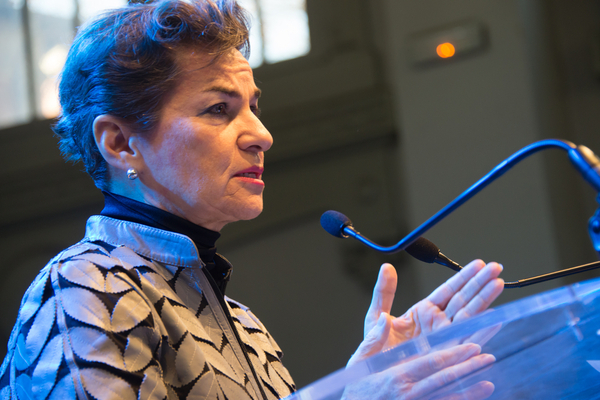TED announced a new climate change initiative called Countdown with the help of YouTube and a coalition of global leaders and nonprofit environmental organizations at an event in New York City. The effort plans to gather new ideas to combat the climate crisis, and is focused on five broad topics: renewable energy, infrastructure, transportation, food, and restoring ecosystems.
Anyone, anywhere can propose an idea. YouTube creators will help spread the word, and the best proposals could be put into motion with the help of businesses, policymakers, and and celebrities supporting the initiative. TED head Chris Anderson announced the new project alongside Christiana Figueres, who led the United Nations Framework Convention on Climate Change during the adoption of the landmark Paris climate agreement in 2015.
Jimmy Kimmel delivered a video recorded message at the launch, while former Vice President Al Gore tuned into a live stream of the event. Calling in from Nashville, Tennessee, Gore told the audience at the launch, “We as human beings have the ability to rise to this occasion when everything is on the line … political will is itself a renewable resource.”
The initiative will culminate in a summit in Bergen, Norway next October to share the solutions that came out of the effort. Countdown will work with a panel of experts and scientists to vet proposals, and the strongest will be turned into TED talks. The talks will be filmed at the summit in Norway, in front of “a hand-picked audience capable of turning those ideas into action,” according to a press release. Countdown aims to spur action to cut global greenhouse gas emissions in half by 2030 and to net-zero by 2050, a path that the United Nations international panel of scientists have said is necessary to avoid the most catastrophic effects of climate change.
“This agenda of cutting emissions is absolutely crucial. How has that been going?” Anderson asked Figueres at the event. “Not very well,” Figueres responded. Greenhouse gas emissions are on track to peak again in 2019, according to a study published last week.
The participation of video heavyweights TED and YouTube is notable, as streaming their products eats up a massive amount of energy. People watch more than a billion hours of Youtube each day, the company announced in 2017. And the amount of greenhouse gas emissions YouTube puts out in a year as a result is about as much as the city of Glasgow, roughly 10 million metric tons of carbon dioxide, one study by researchers at the University of Bristol found. The appetite for streaming video is still growing. Streaming and downloading video online is expected to gobble up 82 percent of all consumer internet traffic by 2022, according to a Cisco white paper. That’s up from 60 percent in 2015.
Anderson says that Countdown has sparked a conversation within the company about its own emissions, but it’s not going to stop streaming videos. “If an idea powered by a little electricity can ignite in someone’s brain, I would bet on the idea over saving electricity,” Anderson said. “Every company needs to do more, and of course it starts at home with reduction of your own carbon footprint.” said Figueres, adding, “But then also, how do your products and services contribute to decarbonizing other peoples’ footprint?”
Just last month, workers at YouTube’s parent company Google demanded that the internet giant do more to reel in its contributions to climate change. They’re calling for the company to cut all its greenhouse gas emissions by 2030 and sever ties with fossil fuel companies and climate-denying groups. Google has been carbon neutral since 2007, meaning it takes measures to offset or cancel out its greenhouse gas emissions. In 2018 it surpassed its goal of purchasing more renewable energy than it uses as a company.
—
Photo Credit: Ryan Rodrick Beiler / Shutterstock.com
